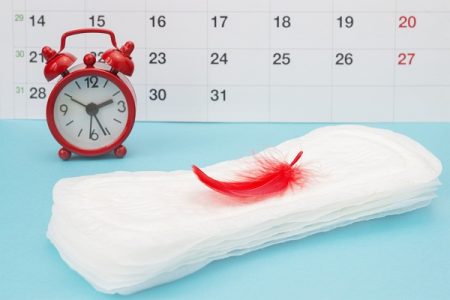Menstrual Relief: How Do You Get Rid of Menstrual Cramps?
- Updated on: Jul 13, 2024
- 4 min Read
By
- Published on Oct 3, 2019


What helps with menstrual cramps? What you can do to relieve your period pain?
There are a few ways that can be followed to help ease you menstrual cramps:
- Take over-the-counter pain medicine like ibuprofen, naproxen, or acetaminophen. They all effectively block the effects of prostaglandins. You should talk with your doctor before taking any pain medication if you have an allergy to aspirin or severe asthma.
- Exercise regularly
- Use hormonal birth control (like the pill, patch, ring, implant, and hormonal IUD)
- Put a heating pad on your belly or lower back
- Take a hot bath
- Rest
- Massage with essential oils to the back and lower abdomen
- Avoid fatty foods, alcohol, carbonated beverages, caffeine and salty foods
The intensity of menstrual cramps decreases as a woman ages. Sometimes they disappear completely after a woman’s first term pregnancy. If there are any other medical conditions or anatomical abnormalities which are thought to contribute to the pain, treatment of the underlying abnormality or condition can bring the relief.
When you should seek medical or emergency care for menstrual cramps?
Generally, majority of women get significant improvement with various natural and home remedies. However, you should call your health-care professional if you experience any of the following:
- Cramps that continue to be painful for longer than usual
- The pain is suddenly worse or different from previous experiences
- There is excessive bleeding, and requires using more than one pad or tampon per hour
- Signs of infection, such as fever, chills, and body aches, occur during your period
- You suspect that you may be pregnant
- Menstrual cramps beginning for the first time in a woman older than 25 years of age
However, you should go to a hospital’s emergency department if any of the following problems occur:
- Fainting
- The sudden onset of intense pelvic pain
- Tissue often appears silvery or greyish
- Dizziness on standing
- Passing of tissue along with menstrual blood
- Possible pregnancy associated with the onset of severe pain
More: Complications and Signs and Symptoms of Uterine Fibroids
More: All About Menstruation (Period): Normal Menstruation Cycle, Painful And Absence
What are the medicines for menstrual cramps? What are various OTC medicines for menstrual cramps? What are the prescription medicines used in menstrual cramps?
Use of an anti-inflammatory medication is the best way to initiate relief of painful menstrual cramps. Nonsteroidal anti-inflammatory drugs (NSAIDs) inhibit the formation of prostaglandins, resulting in reduction of pain and inflammation.
Ibuprofen, naproxen, and ketoprofen are example of NSAIDs and are available over-the-counter without a prescription.
- These medicines give better result when initiated prior to onset of your menstruation. These can be taken for as long as the cramps persist. If one type of OTC medication is not effective, another should be tried because every female doesn’t respond to these medications equally.
- NSAIDs can be harsh on the stomach. If you have a history of kidney disease or stomach problems (such as ulcers or reflux), you should consult with an appropriate healthcare professional prior to initiation of a therapy.
Various hormonal birth control options can also be employed to relieve your menstrual cramps. These can be available in the form of:
- Oral contraceptive pills (OCPs),
- An injection,
- A transdermal patch
- A hormone-releasing intrauterine device
This reduces menstrual flow and the pain that may occur with it. Oral contraceptive pills are usually the preferred choice for women who suffer from significant menstrual discomfort and do not want to become pregnant.
Sometimes, a combination of NSAIDs and hormonal contraceptive methods such as oral contraceptive pills may be needed to relieve menstrual cramping and pain.
Prescription medications such as mefenamic acid or meclofenamate are also used in some cases.
Is it possible to prevent your menstrual cramps?
It might not be possible to prevent menstrual cramps completely. However, maintaining a healthy lifestyle that includes adequate nutrition, a healthy diet, body weight control, and exercise may be helpful.
One preventive step you can take that directly lessens the severity of menstrual cramps is to stop smoking.
More: Dysmenorrhea (Menstrual Cramps): Causes, Symptoms, Diagnosis, Treatment
What are other home remedies for your menstrual cramps? What to eat during periods to reduce pain?
Various herbal remedies contain anti-inflammatory and antispasmodic compounds that are believed to reduce the muscle contractions and swelling associated with menstrual pain. Some of them are:
- Chamomile tea
- Fennel seeds
- Cinnamon
- Ginger
- Pcycenogenol
- Dill
You should try to have diet high in fibre and plants and have minimal processed foods. You should give these foods a try:
- Papaya
- Brown rice
- Walnuts, almonds and pumpkin seeds ( rich in manganese, which eases cramps)
- Chicken, fish and leafy green vegetables (contain iron which can compensate the menstrual loss)
- Flaxseed ( contain omega 3 with antioxidant properties, which reduce swelling and inflammation)
- Avocados, banana and prunes (contain boron; this mineral helps your body absorb calcium and phosphorus. It also reduces menstrual cramps.)
- Dairy products and sesame seeds (rich source of calcium, which can reduce menstrual cramps.)
You should drink plenty of water as it avoids painful bloating during menstruation. Hot or warm water is generally used, as it increases the blood flow to your cramped muscle and relieves the pain.
Acupuncture, acupressure, nitro-glycerine patch, and wearing a TENS (transcutaneous electrical neural stimulation) device can be used as alternate therapies to relive your period pain.
Do bananas help with menstrual cramps?
Bananas are rich source of vitamin B6 and potassium, which stops you from retaining water and feeling bloated. Too little potassium can cause muscle cramping which can cause severity of your menstrual cramps.
It also contains boron which helps in reducing your menstrual cramps. A single banana will replace the potassium you lose from one to two hours of exercise. Oranges is also a good source of potassium.
Is tea good for menstrual cramps?
Tea and coffee contains caffeine. The caffeine has property to constrict blood vessels and increase the tension, which can worsen your menstrual cramps and may also cause anxiety. You should avoid caffeinated tea and beverages. Though, chamomile tea has antispasmodic property which helps in soothing your muscle cramps and pain.











